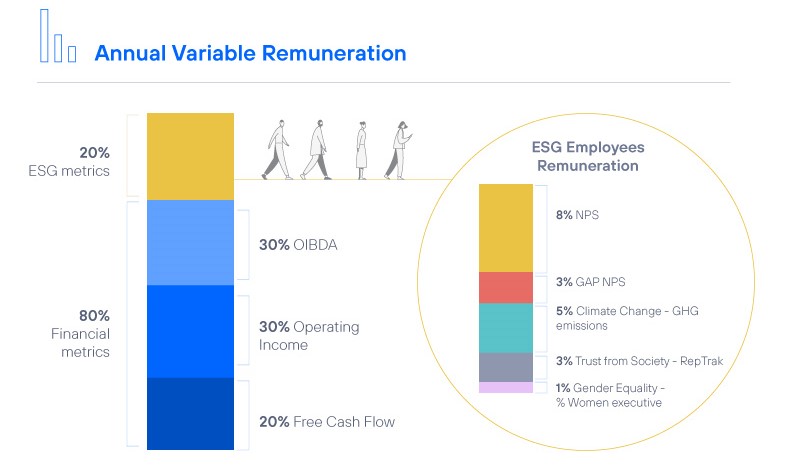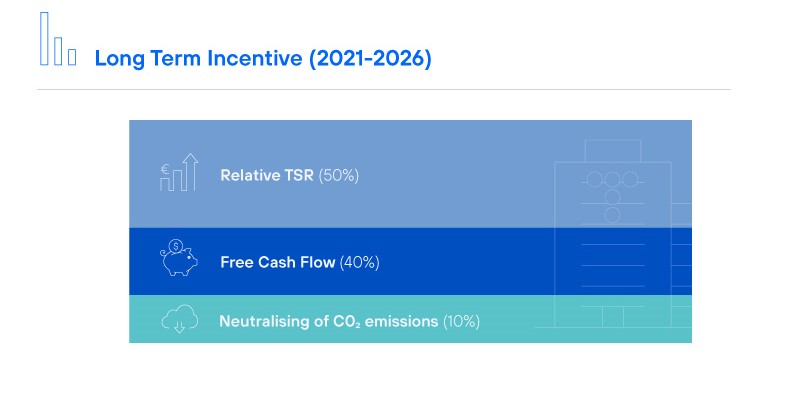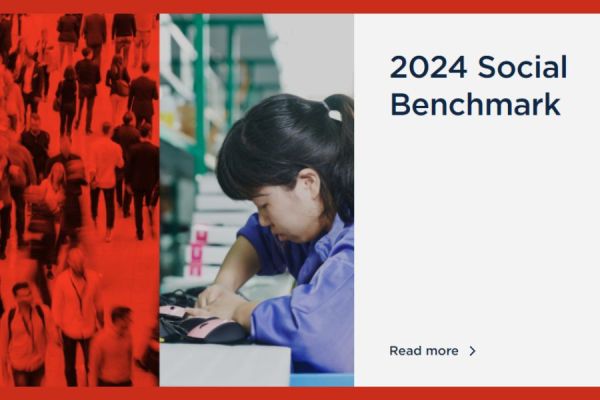Telefónica was one of the first companies in Spain to introduce ESG criteria in the variable remuneration of its executives and staff in 2019. This decision is the result of our commitment to sustainability for more than 20 years as part of its strategy. All the details below:
1- At what level is Telefónica in terms of introducing sustainability criteria in the variable remuneration of its executives and staff?
ESG criteria has presence in the short term variable remuneration of all our human capital, weighting for 20% of the whole annual bonus opportunity, ensuring sustainable value of the company, generating trust among our stakeholders and enhancing the positive impact of our activity. We measure ESG indicators such as customer trust, through NPS (Net Promoter Score) and the NPS gap, which measures the health of Telefónica’s relationship with its customers in a more direct way. We also measure society’s trust through reputation monitoring. Additionally, we have a target for the promotion of gender equality in our workforce, measured by the percentage of female managers, and a target for the fight against climate change, measured by the percentage of emission reductions.
Finally, this year, for the first time, and after our shareholders approval through the 2021 AGM, we introduce ESG criteria in our long-term variable remuneration weighting 10% of the whole LTI opportunity. This way, we boost our commitment to become a zero net emissions company by 2025 in our main markets, enhancing long-term sustainable value creation for our shareholders.

2- What should these criteria be in the present and in the future?
Telefónica strongly believe in sustainability as a key strategic pillar to enhance long-term value to our shareholders. We also believe that remuneration is a powerful communication tool to create culture, communicate values and expected behaviours. Therefore ESG criteria should have presence in our variable remuneration in the future as it does today, reflecting company’s strategic priorities.
We understand value-creation in a holistic way, considering the financial, social and environmental impact of our business. We need to be agents of change, as set out in the 2030 Agenda of the United Nations. Each company has to see how it can make its contribution.
3- Are they general and homogeneous?
ESG criteria has presence in the variable remuneration of all our human capital. Indicators considered are general and homogeneous, whilst targets are challenging, pre-determined, specific, quantifiable and aligned with the local reality of our businesses in the different jurisdictions.
4- What happens or what should happen if a manager meets these criteria but does not meet the financial criteria?
Short and long-term variable remuneration targets are approved by the Board, and its level of achievement is subject to sufficient verification, audited by our internal and external auditors, before it is submitted to the Board for approval at the proposal of the Nominating, Compensation and Corporate Governance Committee. Variable remuneration metrics are additive, which means that the fact of not achieving one of them does not lead to zero pay-out of the short or long-term variable remuneration. However, the Board has the discretion to adjust final results under specific circumstances, so that variable remuneration pay-out reflects the real performance of the company, protecting our shareholders and in line with the commitment of Telefónica to designing a Remuneration Policy that is in line with prudent risk management.

5- How are the KPIs organised?
ESG criteria considered in our short-term variable remuneration weights 20% of the whole annual bonus opportunity, and its indicators are structured as follows:
- Customer trust KPI: increase in NPS and GAP NPS. These KPIs show the willingness to recommend our services or products, as well as the gap with the main competitor in each market.
- Company trust KPI: Improvement in the RepTrak® Pulse, the metric we use to measure reputation (society’s perception of Telefonica). It evaluates the emotional attraction that a person has towards our company according to 4 fundamental elements: admiration and respect, overall esteem, trust and good feeling.
- Climate change KPI: reduction of direct and indirect CO2 emissions caused by our daily activity due to fuel consumption, refrigerant gas leakage and electricity use.
- Gender equality KPI: increase in the number of women in management positions in the company.
Additionally, ESG criteria has also presence in our long-term variable remuneration weighting 10% of the whole annual LTI opportunity. The indicator considered is CO2 Emissions Neutralization & Reduction, in line with the 1.5ºC scenario of the Paris Agreement (SBTi) and with the Telefónica’s objective of net zero emissions by 2025 in its main markets for scopes 1 + 2.










